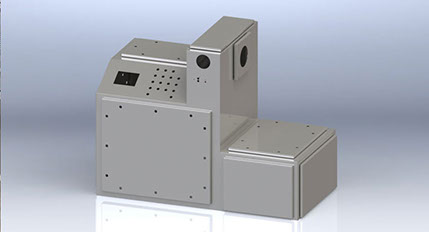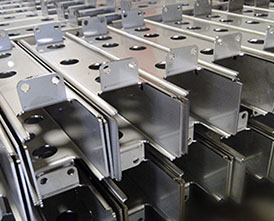Sheet Metal Fabrication
Fabrication services range from low-volume prototype to high-volume production runs.







1
Sheet metal fabrication is the process of forming parts from a metal sheet by punching, cutting, and/or bending. It may include cutting, forming, machining, welding, and assembly to create the final product.
Metal fabrication projects include everything from simple parts to heavy and complex equipment and machinery.
Sheet metal parts are known for their durability, which makes them great for end-use applications (e.g. chassis). Parts used for low volume prototypes and high volume production runs are most cost-effective due to large initial setup and material costs.
By applying the engineering knowledge, professional software and complete types of equipment together, we can design, manufacture and develop industrial parts and complex sheet metal working projects. Our custom sheet metal services offer a cost-effective and on-demand solution for your manufacturing needs. Fabrication services range from low-volume prototype to high-volume production runs.
Whether you need a single specialty item, a piece of equipment made right away or a large-scale production run was done in a matter of weeks, you will need efficient and affordable sheet metal fabrication. This will require finding a company that has access to the latest equipment and technology, enabling them to take your plans and produces exactly the product you need in a timely manner, on a budget, and with no or at least minimum waste. Ideally, the company will have a great deal of experience in projects like yours and references to back up their claims. Finding the perfect fabricator is more than worth the time. Here are a few things to consider while you are looking for an ideal service provider.
Short Lead Times and Emergency Services
You cannot wait several months for your order to be completed. In most cases, you should be able to have your order fulfilled with a lead time of no more than two to four weeks. If production times take longer you run the risk of not having your product completed and delivered to your work site when you need it. This, in turn, can lead to cost overruns as can shipping issues. Shipping and handling of a fabricated sheet metal product can be a difficult and delicate procedure. Even with the expertise and knowledge of a reputable fabricator, unexpected accidents can occur. So you should ensure your fabrication company of choice has the experience and bandwidth to repair, replace, or remedy any damage to your product and still meet your project deadlines.
High Production Volume
There are times when you will require a very large production volume to fulfill your work order and maximize your profitability. Quality fabrication services should be capable of producing thousands of units with a reasonably short lead time and using the latest technology. An efficient fabricator will take your plans, help you to choose the correct metal types, and determine the best method by which they can get your job done right, on time and on a budget.
Choose Wisely
No matter what your sheet metal needs might be, from a small emergency run to full-scale production of thousands of units, the best fabricators will have the equipment, skills, experience, and ability to get the job done right, on-time, and on budget. As long as you abide the lead times and provide the proper file formats, your sheet metal fabrication needs can be handled quickly, efficiently, affordably, and without sacrificing quality.
Ductwork Fabrication
Custom industrial ductwork is typically used to convey air or gas carrying particulate through an industrial facility. Often, this fluid travels through the ductwork at high temperatures. Applications include dust collection, HVAC, and fume extraction in facilities such as feed mills, sand plants, and steel mills.
With such intense general circumstances, plus all sorts of industry-specific regulations that come into play when designing and installing duct systems in industrial plants, it’s no wonder that most industrial ductwork is custom designed and custom fabricated.
Finding the right custom metal fabricator to manufacturer your industrial ductwork is an important decision. You’ll want a company that instantly understands your engineering drawings, can help anticipate any issues that may arise during the fabrication process, and can expedite production thanks to its experience with the type of product.
Quality control for metal fabrication
Quality control for custom metal fabrication is a crucial part of the process. Without high standards and well-thought-out quality control procedures, metal fabricators will find it extremely challenging to meet customer expectations.
Because custom metal fabrication often involves multiple processes, it is critical to have well-documented quality control procedures. Any shop manuals should include quality standards and inspections policies for drawings and specifications, welding procedures, welder qualifications, materials, welding inspections, and handling, storage, and shipping.
At LaserSpike, we combine our quality guidelines and procedures with information obtained from our customers to create products that meet and exceed their expectations.
Here is some insight into how we manage quality control at our industrial metal fabrication facility.
Drawings & Specifications
A successful project starts with high-quality engineering drawings and specifications. In this area, our engineering manager has the latitude to make adjustments to drawings and specifications based on quality and/or regulatory standards, while maintaining design intent. Once the quality control manager reviews plans from Engineering, the shop manager and quality control manager work together to complete the project.
Materials
To monitor our suppliers, we require that our raw material vendors provide markings on materials that verify some main specification like the manufacturer or trade name, sheet thickness, material properties, and/or other specialized data according to the customer's requirement.
Cutting and bending
In the process of the cutting and bending, the quality control unit must have continuous monitoring to ensure that the product is in accordance with the approved and calibrated requirements. At this point, if our experts find that there is an error, they promptly issue a stop order. They are inspected for:
- Dimensional and angular accuracy
- Distortion (twist, flatness, etc.)
- Bolt hole accuracy, edge distance, flange size, and angle accuracy.
- Removal of burrs and splatter
Welding
At LaserSpike, welding wrocedure are planned by and qualified with the quality control manager. We only use qualified welders and the quality control manager and the shop manager are responsible for maintaining a performance qualification file for each welder and welding operator. All aspects of welding are periodically monitored by the quality control managers’ personnel as well as the welder’s supervisor. If any systematic error is discovered, the quality control manager confers with production management to decide on actions that will be taken to resolve the issue.
Handling, Storage & Shipping
Once a product is complete, our quality control efforts don’t stop. We diligently make sure each piece is properly marked and identified. They are placed on skids or platforms or otherwise properly stored to prevent damage. And materials are always securely blocked to prevent any damage in shipping.
Improperly handling, storing, or shipping your final product can negate many of our previous quality control efforts so we take these steps very seriously.
Our Quality Control Goals
LaserSpike is committed to meet the requirements of customers, while producing a quality, affordable product, with dependable delivery. We pride ourselves on the reliable service and quality of the finished product.



























